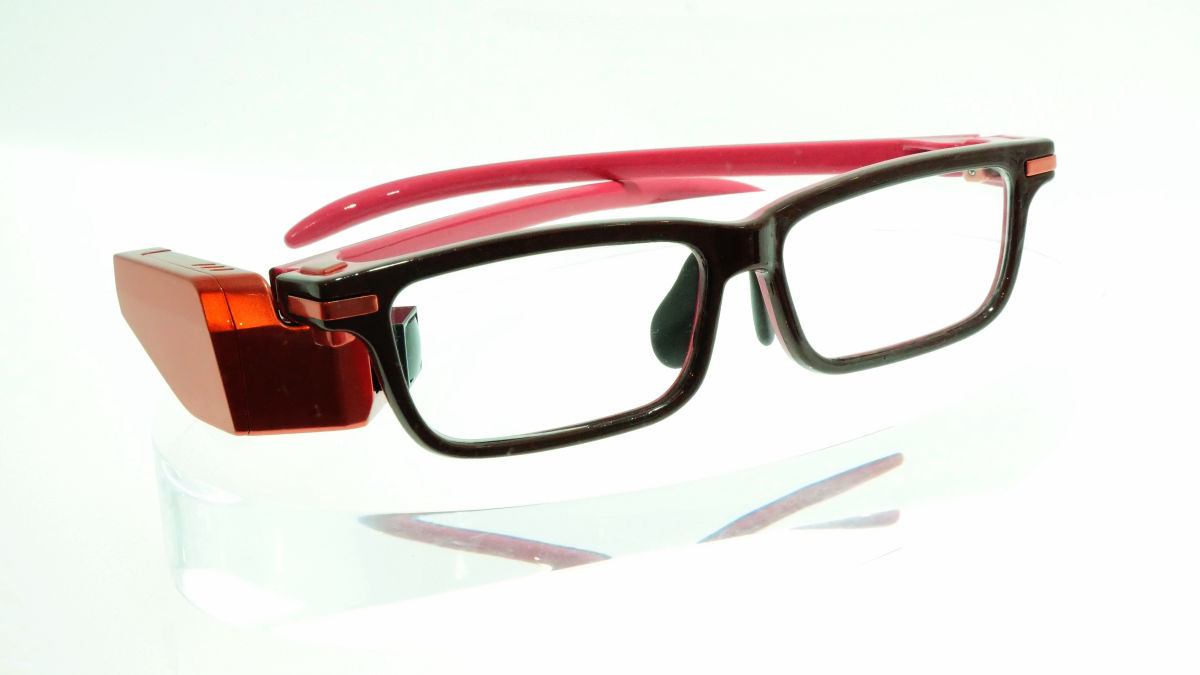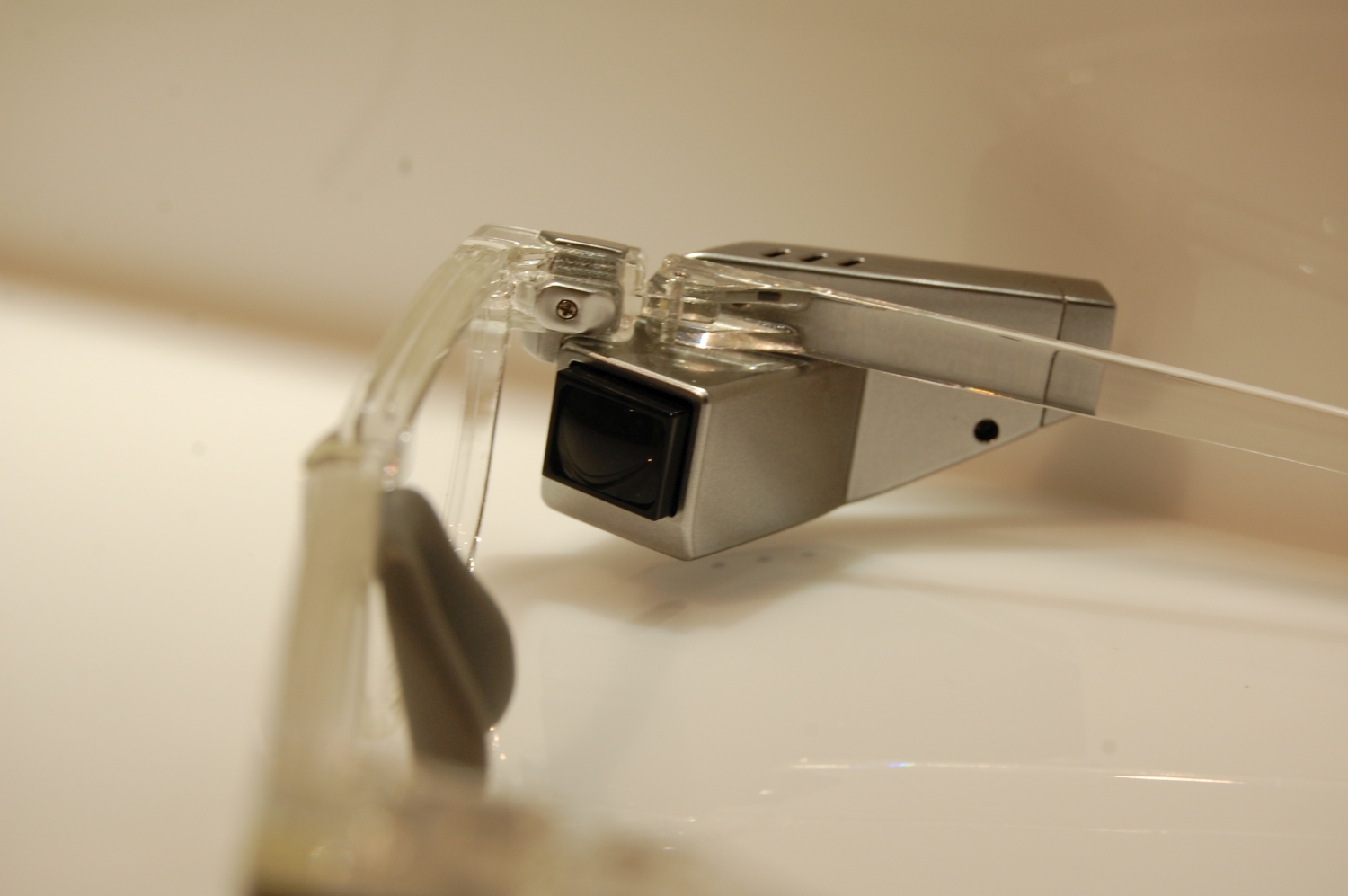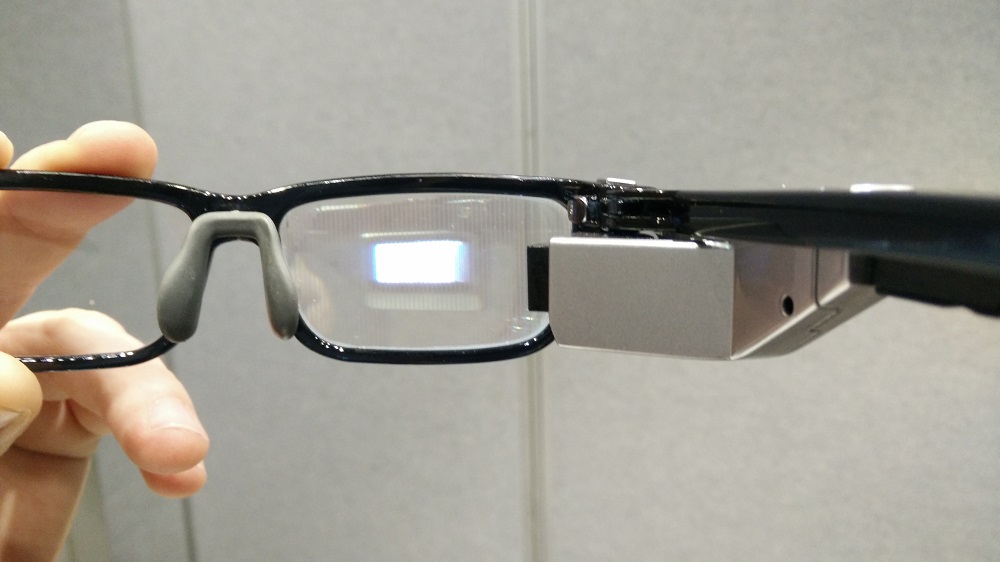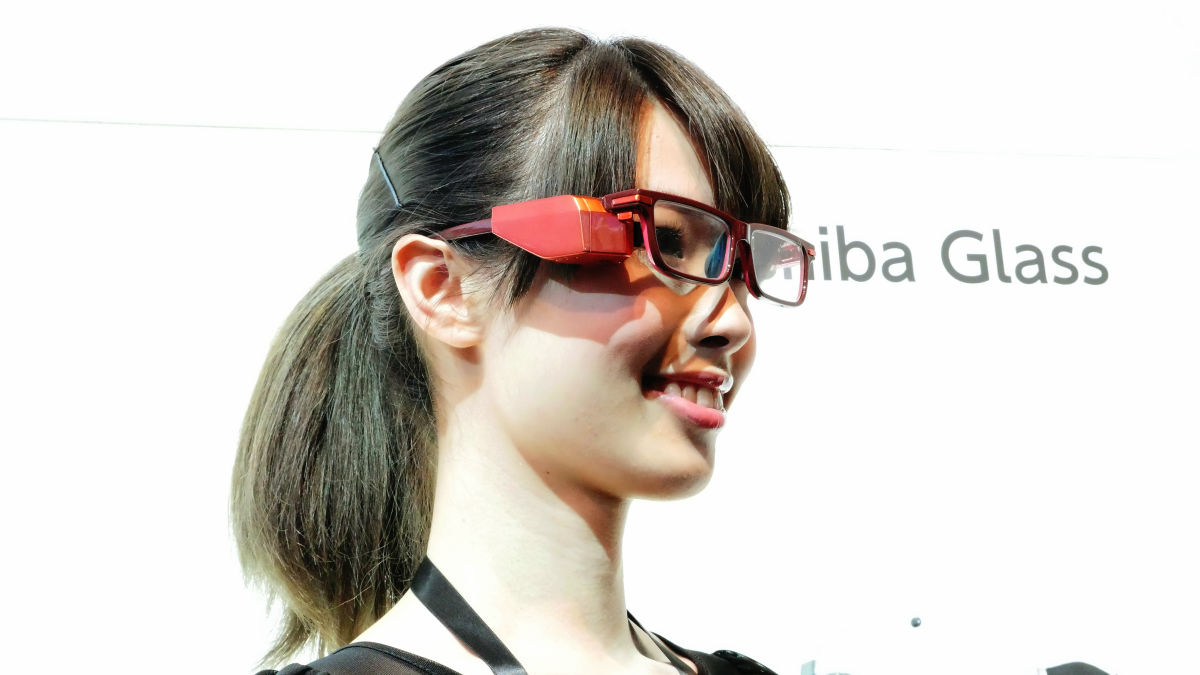Difference between revisions of "Toshiba Glass"
(added pictures) |
(references) |
||
| Line 1: | Line 1: | ||
[[File:ToshibaGlass_1.jpg|thumb|right|alt=Toshiba Glass|Toshiba Glass.]] | [[File:ToshibaGlass_1.jpg|thumb|right|alt=Toshiba Glass|Toshiba Glass.]] | ||
| − | Toshiba Glass is currently in prototype stage. Changes are expected before it becomes a finalized product for the market. The device looks like an ordinary pair of glasses with a tiny projector clipped on the side, which project images onto the reflective glass lens fitted into the frames. The image appears in the middle of field of vision. [ | + | Toshiba Glass is currently in prototype stage. Changes are expected before it becomes a finalized product for the market. The device looks like an ordinary pair of glasses with a tiny projector clipped on the side, which project images onto the reflective glass lens fitted into the frames. The image appears in the middle of field of vision.<ref name="toshibaglasshandson">ALLSOPP, Ashleigh. Toshiba Glass hands-on review: Toshiba's first smartglasses aim to take on Google Glass. PC Tech Advisor [online]. 2015, Jan 8. Available online at: http://www.pcadvisor.co.uk/review/wearable-tech/toshiba-glass-hands-on-review-3593254/#top (Retrieved Jul 29, 2015)</ref> The projector can be removed from the foldable frame. The device is connected to a smartphone by cable and draws information and power from it. This makes the device lightweight (42 grams) and comfortable to wear. It is not equipped with a camera. Applications for the device are still under development. |
== Main characteristics == | == Main characteristics == | ||
| Line 23: | Line 23: | ||
* Prototype first presented at CEATEC Japan 2014, followed by CES 2015. | * Prototype first presented at CEATEC Japan 2014, followed by CES 2015. | ||
| − | * It won the Mobile Technology award at CEATEC Japan 2014. [ | + | * It won the Mobile Technology award at CEATEC Japan 2014.<ref>New technology concept attracts worldwide media attention. Smart Community Blog, Toshiba Corp. [online]. 2014, Nov 6. Available online at: http://www.toshiba-smartcommunity.com/en/blog/toshiba_glass (Retrieved Jul 29, 2015)</ref> |
* Toshiba announced the release of Toshiba Glass during the second half of 2015 only as a customized solution for enterprises. | * Toshiba announced the release of Toshiba Glass during the second half of 2015 only as a customized solution for enterprises. | ||
* The company plans to release a consumer version in the future, but the release date is not yet specified. | * The company plans to release a consumer version in the future, but the release date is not yet specified. | ||
| Line 39: | Line 39: | ||
== Public & Media Impact and Presentation == | == Public & Media Impact and Presentation == | ||
| − | The existing reviews are based on Toshiba Glass demonstration at CEATEC Japan 2014 and CES 2015. The device is praised for being lightweight, for clear full-colour image, and design. Listed as shortcomings are cable connection to external device and lack of camera. [ | + | The existing reviews are based on Toshiba Glass demonstration at CEATEC Japan 2014 and CES 2015. The device is praised for being lightweight, for clear full-colour image, and design. Listed as shortcomings are cable connection to external device and lack of camera.<ref name="toshibaglasshandson"/><ref>NICCOLAI, James. Toshiba's smart glasses ditch Google's over-the-lens prism. PCWorld [online]. 2014, Oct 6. Available online at: http://www.pcworld.com/article/2692012/toshiba-shows-glasses-with-embedded-display.html (Retrieved Jul 29, 2015)</ref><ref>EMRICH, Tom. Toshiba has its own smartglasses for the enterprise market. Mobile Syrup [online]. 2015, Jan 11. Available online at: http://mobilesyrup.com/2015/01/11/toshiba-has-its-own-smartglasses-for-the-enterprise-market/ (Retrieved Jul 29, 2015)</ref> |
== Public Policy == | == Public Policy == | ||
Revision as of 13:15, 29 July 2015
Toshiba Glass is currently in prototype stage. Changes are expected before it becomes a finalized product for the market. The device looks like an ordinary pair of glasses with a tiny projector clipped on the side, which project images onto the reflective glass lens fitted into the frames. The image appears in the middle of field of vision.[1] The projector can be removed from the foldable frame. The device is connected to a smartphone by cable and draws information and power from it. This makes the device lightweight (42 grams) and comfortable to wear. It is not equipped with a camera. Applications for the device are still under development.
Contents
Main characteristics
No technical specifications available yet.
Purpose
Industrial, retail, security, medical and healthcare use; entertainment, lifestyle, sports.
Company & People
Toshiba Corporation was founded in 1875. Its headquarters are in Tokyo, Japan, with offices worldwide.
President and CEO: Hisao Tanaka; Board of Directors: Masashi Muromachi, Chairman of the Board and Director; Norio Sasaki, Vice Chairman of the Board and Director;
Directors: Hisao Tanaka, Masahiko Fukakushi, Toshio Masaki, Keizo Maeda, Makoto Kubo, Hidejiro Shimomitsu, Kiyoshi Kobayashi, Naoto Nishida, Fumiaki Ushio, Seiya Shimaoka; Outside Directors: Hiroyuki Itami, Kiyomi Saito, Ken Shimanouchi, Sakutaro Tanino.
Important Dates
- Prototype first presented at CEATEC Japan 2014, followed by CES 2015.
- It won the Mobile Technology award at CEATEC Japan 2014.[2]
- Toshiba announced the release of Toshiba Glass during the second half of 2015 only as a customized solution for enterprises.
- The company plans to release a consumer version in the future, but the release date is not yet specified.
Ethical Issues
Health Risks
Enhancement/Therapy/Treatment
Public & Media Impact and Presentation
The existing reviews are based on Toshiba Glass demonstration at CEATEC Japan 2014 and CES 2015. The device is praised for being lightweight, for clear full-colour image, and design. Listed as shortcomings are cable connection to external device and lack of camera.[1][3][4]
Public Policy
Related Technologies, Project or Scientific Research
References
- ↑ 1.0 1.1 ALLSOPP, Ashleigh. Toshiba Glass hands-on review: Toshiba's first smartglasses aim to take on Google Glass. PC Tech Advisor [online]. 2015, Jan 8. Available online at: http://www.pcadvisor.co.uk/review/wearable-tech/toshiba-glass-hands-on-review-3593254/#top (Retrieved Jul 29, 2015)
- ↑ New technology concept attracts worldwide media attention. Smart Community Blog, Toshiba Corp. [online]. 2014, Nov 6. Available online at: http://www.toshiba-smartcommunity.com/en/blog/toshiba_glass (Retrieved Jul 29, 2015)
- ↑ NICCOLAI, James. Toshiba's smart glasses ditch Google's over-the-lens prism. PCWorld [online]. 2014, Oct 6. Available online at: http://www.pcworld.com/article/2692012/toshiba-shows-glasses-with-embedded-display.html (Retrieved Jul 29, 2015)
- ↑ EMRICH, Tom. Toshiba has its own smartglasses for the enterprise market. Mobile Syrup [online]. 2015, Jan 11. Available online at: http://mobilesyrup.com/2015/01/11/toshiba-has-its-own-smartglasses-for-the-enterprise-market/ (Retrieved Jul 29, 2015)



